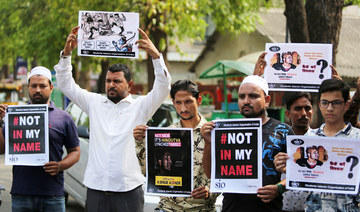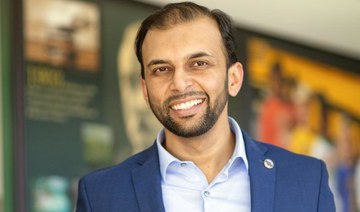NEW DELHI: The top news in the Friday afternoon bulletin was a report on nationwide celebrations of Ganesha, elephant-headed Hindu deity of good beginnings, with people full of enthusiasm, forgetting about the gloom the coronavirus had lately cast on their lives. This is Good News Today (GNT), India’s latest TV channel.
Launched by leading media house India Today last week, the Hindi-language channel will present only the “good news.”
“It will showcase stories of hope, human triumph, innovation and inspiration from different walks of life, from different parts of India and the world,” India Today Group vice chairperson Kalli Purie told Arab News on Friday.
“We will focus on showcasing stories from India and around the world.
Good news and good deeds need to be celebrated and shared no matter what the origin is.”
“Good News Today rests on the motto of ‘acchi khabar, sacchi khabar’ (good story, true story),” Purie said. “We all need a smile, words to encourage us and the ability to see the good around us, amid all the gloom, because without that we are sunk. This is a channel that appeals to the heart.”
India has more than 160 national and regional news channels. Two of them with the largest viewership are the Hindi-language Aaj Tak and the English-language India Today, both owned by India Today Group. “India Today Group has always been a catalyst for the media landscape in India by creating new, relevant and engaging products that are right for their time,” Purie said.
The new channel has emerged as the country’s position has been falling rapidly on the World Press Freedom Index by Reporters Without Borders. In 2016, it was 136th, but in 2020 dropped to 142nd among 180 countries listed.
HIGHLIGHTS
• Launched by India’s leading media house, India Today, the Hindi-language channel aims to present only positive news.
• India Today Group vice chairperson says the new channel’s guiding principle is ‘good story, true story.’
The index, released in April, said it was one of the world’s most dangerous countries for journalists trying to do their job properly.
Critics say that ever since Prime Minister Narendra Modi came to power in 2014, the Indian media has been losing its independent voice. “Most of the media houses have lost their critical voices and become the mouthpiece of the government,” Delhi based-media critic Sandeep Bhushan said, adding that the launching of the new channel cannot be separated from the present political context.
“In 2018, Modi talked about news channels showing good news. Therefore, the concept of a channel showing only good news is very close to Modi’s heart,” the author of “The India Newsroom: Studios, Stars and the Unmaking of Reporters,” told Arab News. “You cannot separate the existing political context from the launch of a news channel at a time when the media is facing a huge financial crunch due to slowdown in the Indian economy.”
Saumitra Bansal, an education expert in the eastern Indian city of Patna, said she had given up on the Indian media.
“Most of the Indian media houses have compromised with their news content and as a result I have lost interest in watching news channels,” she said. “There is no guarantee that the new channel would be different.”
But some viewers see the emergence of the good news-only channel as a positive development when other things around generally are not fine.
“Be it economics, be it coronavirus or be it the overall sentiments of the people, they are not feeling good. A channel that only shows good news is a welcome step,” Rajiv Singh, a businessman from Noida said.
Sevanti Ninan, from the New Delhi-based media watchdog The Hoot, also sees potential in the new channel, which could employ solutions journalism — reporting focusing on responses to social issues and possible, positive solutions to them.
“The channel could incorporate that,” she said. “If it is intelligently and imaginatively done, it has potential when there is a lot of negativism around.”



























